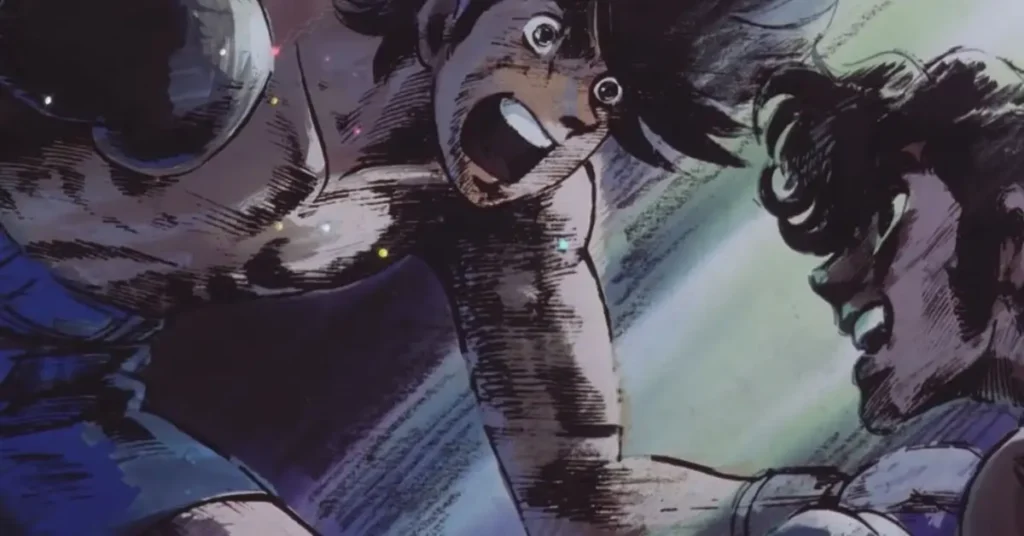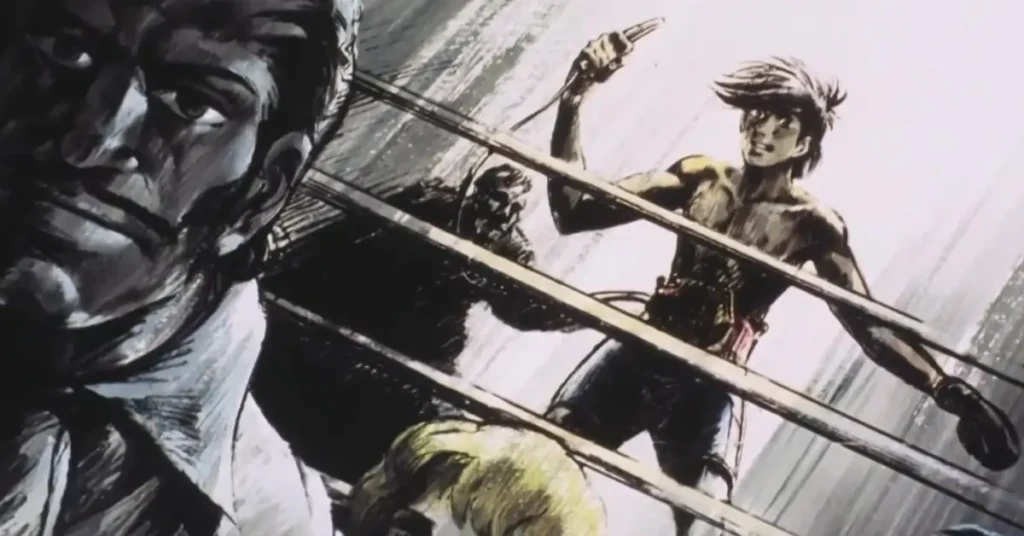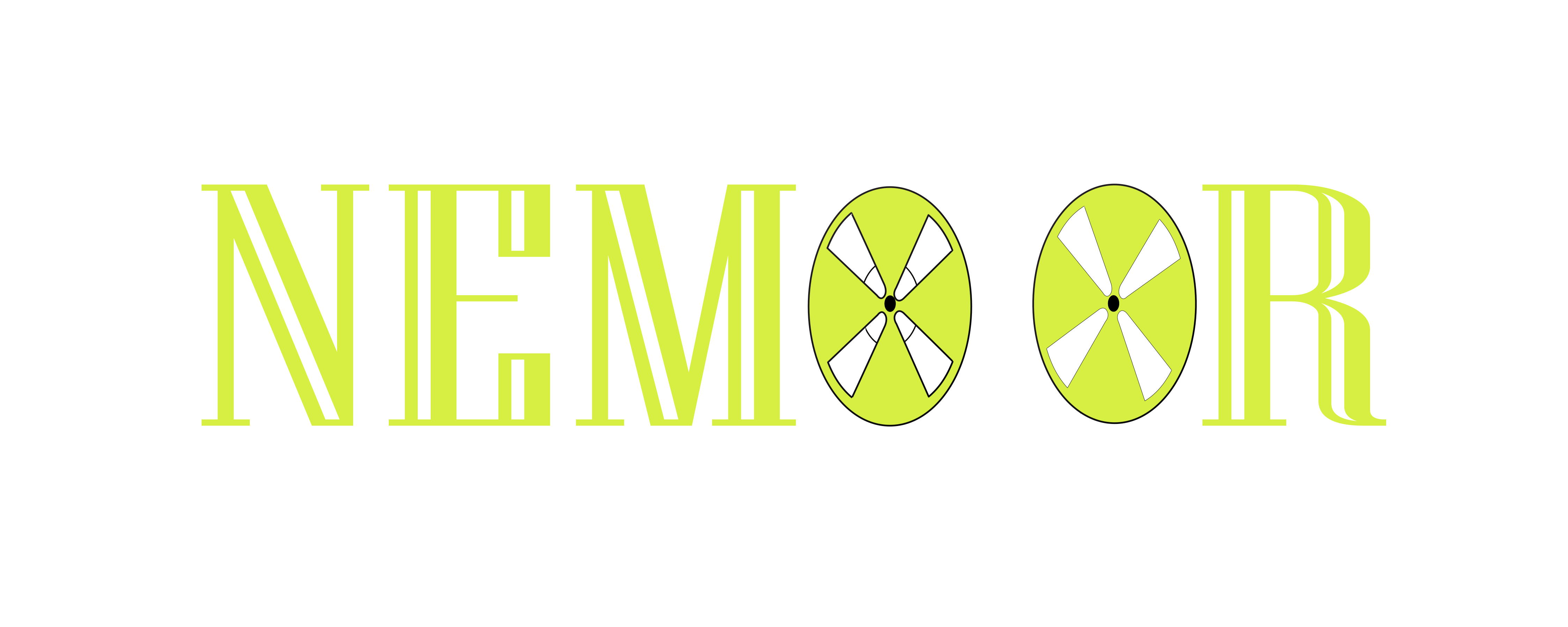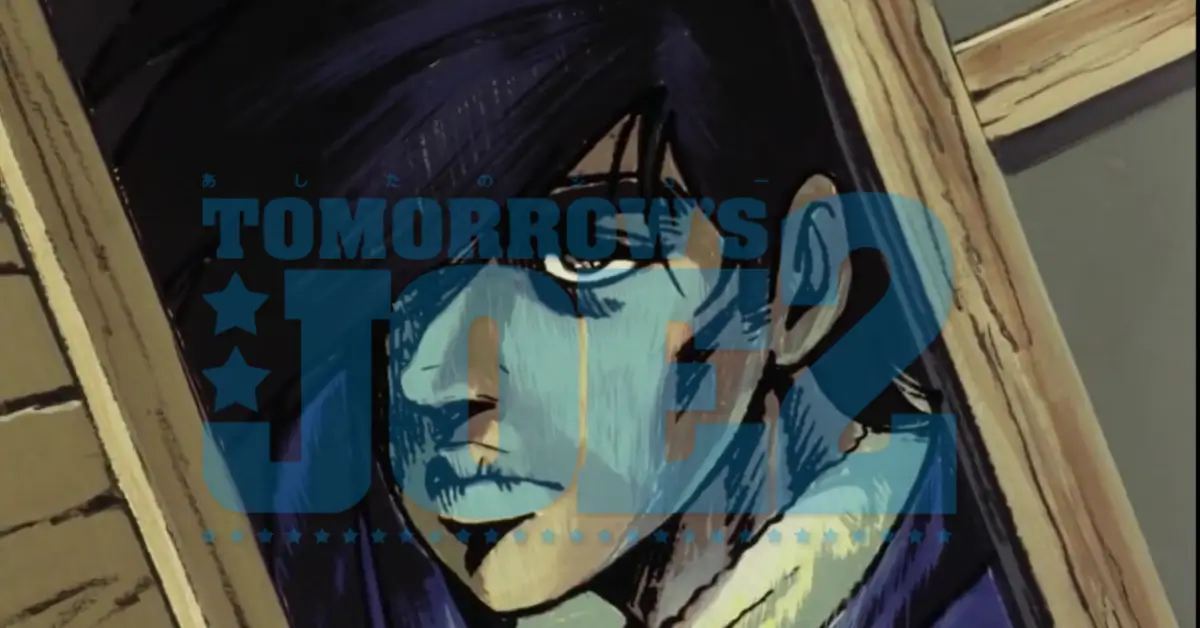Tomorrow’s Joe 2 (1980): The Psychological Price of Glory in the Ring
In the weathered corners of a boxer’s mind, triumph and destruction dance in perfect synchronicity the second chapter of Joe Yabuki’s journey excavates the darkest recesses of a fighter’s psyche, where victory’s glow casts the longest shadows.
Thank you for reading this post, don't forget to subscribe!Introduction
Tomorrow’s Joe 2 (あしたのジョー2, Ashita no Joe 2), the 1980 sequel to the influential sports anime that first captivated Japanese audiences in the 1970s, transcends conventional athletic narratives to deliver a profound meditation on the psychological cost of ambition. Following the continuing saga of Joe Yabuki, a slum-raised boxer whose ascent through the ranks comes at devastating personal expense, this sequel delves deeper into themes of identity, purpose, and self-destruction that resonated deeply with post-war Japanese society.
Beyond its compelling boxing sequences, the series offers an unflinching examination of mental health issues rarely addressed in sports narratives of its era: depression, identity crisis, survivor’s guilt, and the psychological toll of physical trauma. Through Joe’s relentless pursuit of meaning in the ring and his relationships with those in his orbit, the series raises haunting questions about the price of glory and the thin line between dedication and self-annihilation. This examination explores how Tomorrow’s Joe 2 uses the boxing genre to illuminate universal psychological struggles with remarkable emotional authenticity.

Basic Film Information
Title: Tomorrow’s Joe 2 (あしたのジョー2, Ashita no Joe 2)
Release Date & Production Year: 1980-1981
Director: Osamu Dezaki (known for his innovative visual techniques and psychological depth)
Screenwriter: Adapted from the manga by Tetsuya Chiba and Asao Takamori (Ikki Kajiwara)
Main Cast:
- Joe Yabuki: The protagonist, a talented boxer from the slums haunted by his past
- Tōru Rikiishi: Joe’s former rival whose death continues to haunt him
- Yōko Shiraki: Daughter of a wealthy family who manages boxers and maintains a complex relationship with Joe
- Carlos Rivera: A Mexico-born boxer who becomes Joe’s ultimate challenger
- Danpei Tange: Joe’s dedicated trainer who witnesses his rise and struggles
Genre: Sports drama/Psychological character study
Awards: While specific awards information for this 1980s anime series is limited in Western documentation, the series is recognized as a seminal work in anime history and sports drama
Runtime & Rating: 47 episodes, equivalent to TV-14 for thematic content and boxing violence
Plot Summary
Tomorrow’s Joe 2 begins in the aftermath of tragedy. Having witnessed the death of his rival Tōru Rikiishi following their brutal match, Joe Yabuki has temporarily abandoned boxing, wandering aimlessly through life while haunted by survivor’s guilt. The psychological weight of Rikiishi’s death manifests in Joe’s self-destructive behavior and emotional numbness a portrayal of grief and trauma that anchors the series’ exploration of mental health.
As Joe eventually returns to boxing, the narrative explores how his psychological state both propels and undermines his career. His motivation becomes increasingly complex: fighting not just for victory or redemption, but to honor Rikiishi’s memory by pushing himself to the absolute limit. This obsession with proving his worth through suffering creates a compelling psychological portrait of an athlete whose relationship with his sport becomes fundamentally self-destructive.
Key turning points in the narrative revolve around Joe’s psychological evolution rather than merely his athletic achievements. His relationship with weight management becomes particularly symbolic, as he pushes his body to dangerous extremes to compete in weight classes that maximize his challenge rather than his advantage. This self-imposed suffering reflects Joe’s internal belief that he must continuously punish himself for surviving while Rikiishi did not.
The series culminates in Joe’s championship fight against Carlos Rivera, a boxer with parallel psychological motivations. Their match transcends sport to become an existential confrontation two men seeking meaning through mutual destruction. The famous and controversial ending, with its ambiguous portrayal of Joe’s fate, serves as the ultimate commentary on the psychological price of dedicating one’s entire being to a singular purpose.

Setting & Cinematic Techniques
The ring stands illuminated amid darkness less a sporting venue than a psychological crucible where men strip away pretense until only their essential nature remains. Each punch landed is both physical impact and emotional revelation; each drop of sweat and blood the visible manifestation of invisible wounds.
Director Osamu Dezaki employs revolutionary visual techniques to externalize psychological states throughout Tomorrow’s Joe 2. His signature “Dezaki freeze frames” capture moments of emotional intensity, transforming them into near-painterly compositions that allow viewers to linger on psychological turning points. The technique creates visual punctuation that emphasizes internal revelations over external action.
The series employs stark contrasts in its color palette to reflect Joe’s psychological journey. Early episodes feature desaturated tones mirroring his emotional numbness following Rikiishi’s death. As Joe reconnects with his purpose, colors intensify, with the boxing ring often bathed in dramatic lighting that isolates the fighters from the world beyond a visual representation of how combat narrows existence to its most essential elements.
Particularly innovative is the series’ approach to depicting physical punishment as psychological experience. Rather than merely showing the external damage of fights, Dezaki frequently shifts to impressionistic sequences that visualize the subjective experience of pain, exhaustion, and determination. These sequences blend realistic physical detail with surreal visual metaphors, creating a visual vocabulary for psychological states that words cannot adequately describe.
Sound design enhances these psychological portraits, with heartbeats, breathing, and the impact of gloves against flesh amplified to create an immersive sensory experience. The score shifts between minimal, tension-building silence during moments of psychological focus and more dramatic orchestration during emotional breakthroughs, creating a sonic landscape that guides viewers through Joe’s internal experience.
Acting & Character Portrayal
The voice performances in Tomorrow’s Joe 2 deliver remarkable psychological nuance despite the limited animation technology of the era. Joe’s character portrayal particularly stands out for its refusal to simplify complex emotional states. His journey encompasses depression, purposelessness, renewed determination, and ultimately a form of transcendence all conveyed through vocal performance that captures subtle shifts in his psychological state.
Supporting characters serve as mirrors reflecting different aspects of mental health challenges. Danpei Tange, Joe’s trainer, represents the perspective of those who care for someone struggling with self-destructive tendencies his concern for Joe’s wellbeing often contrasting with Joe’s single-minded focus on proving himself in the ring. Yōko Shiraki embodies the outsider’s perspective, simultaneously drawn to and disturbed by Joe’s intensity, raising questions about the fine line between dedication and pathology.
The portrayal of Carlos Rivera adds particular psychological complexity to the final arc. Rather than presenting a simple antagonist, the series develops Rivera as a parallel to Joe another fighter whose identity has become inseparable from his sport. Their mutual recognition creates some of the series’ most poignant moments, suggesting that only someone equally consumed by boxing could truly understand Joe’s psychological state.
What distinguishes these characterizations is their ambiguity. The series never definitively labels Joe’s psychological struggles as either heroic dedication or dangerous obsession, instead allowing viewers to consider the complex relationship between mental health and competitive drive.
Mental Health Representation: Strengths & Weaknesses
Tomorrow’s Joe 2 understands what many stories miss that sometimes our greatest strengths and most profound damages spring from the same source. Joe’s inability to separate his identity from boxing becomes simultaneously his path to transcendence and self-destruction, a contradiction the series refuses to resolve into simple moral lessons.
The series’ greatest strength lies in its unflinching portrayal of the psychological toll of elite athletics. Decades before sports psychology entered mainstream consciousness, Tomorrow’s Joe 2 explicitly connected physical performance with mental health, showing how the demands of professional boxing affect Joe’s psychological wellbeing beyond the immediate concerns of victory or defeat.
Particularly groundbreaking is the series’ portrayal of survivor’s guilt. Joe’s complex emotional response to Rikiishi’s death including self-destructive behavior and the need to prove himself worthy of survival represents one of anime’s earliest nuanced depictions of this psychological phenomenon. The narrative never reduces this to simple motivation for revenge or glory but maintains its complexity throughout the series.
The show also provides remarkable insight into identity formation through athletics. Joe’s character arc explores how completely his sense of self becomes intertwined with boxing, raising questions about purpose and meaning that transcend sports narrative conventions. This exploration predates contemporary discussions about athlete identity and retirement transitions by decades.
However, the series occasionally romanticizes self-destructive dedication in ways that modern mental health perspectives might question. While it portrays the consequences of Joe’s single-minded focus with unflinching honesty, the narrative sometimes frames his willingness to sacrifice everything including his health and potentially his life as the ultimate expression of athletic purity rather than potentially problematic behavior requiring intervention.
Additionally, while the psychological portrayal of principal characters shows remarkable depth, the series offers limited exploration of treatment or recovery models beyond individual willpower and determination. This reflects both the era’s understanding of mental health and the dramatic requirements of the story, but may reinforce the notion that psychological struggles are battles to be fought alone rather than conditions requiring support.
Critical Reception & Awards
Tomorrow’s Joe 2 has maintained its reputation as a landmark in anime history, with critics particularly praising its psychological depth and visual innovation. While specific awards information from its original release is limited in Western documentation, the series’ cultural impact in Japan cannot be overstated.
Critics have consistently highlighted how the series transcended its sports genre trappings to deliver sophisticated character studies. Renowned anime scholar Susan J. Napier has cited the Tomorrow’s Joe saga as exemplifying how Japanese animation addressed post-war themes of struggle, identity, and purpose through seemingly straightforward genre narratives.
The controversial ending generated particular critical discussion, with some viewers interpreting it as unnecessarily tragic and others seeing it as the only conclusion consistent with Joe’s character psychology. This debate continues among anime historians, reflecting the psychological complexity that elevates the series beyond typical sports narratives.
Contemporary critics revisiting the series often note how its psychological themes remain relevant despite changes in animation technology and storytelling conventions. The portrayal of mental health challenges connected to athletic identity continues to resonate with modern audiences familiar with real-world discussions about athlete psychological wellbeing.
Cultural & Social Impact
Tomorrow’s Joe occupies a singular position in Japanese cultural history, with the original manga and both anime adaptations speaking directly to post-war experiences of struggle, aspiration, and the search for meaning amid hardship. The character of Joe Yabuki became an iconic figure representing working-class determination against seemingly insurmountable odds.
The series gained particular resonance during Japan’s economic transformation, with many viewers connecting Joe’s physical and psychological battles to their own experiences navigating rapid social change. His refusal to surrender despite overwhelming challenges reflected national narratives of recovery and reinvention.
The famous image of Joe sitting burned white in his corner after his final fight became one of anime’s most enduring and discussed visual metaphors. This striking representation of a fighter who has given everything physically and psychologically continues to appear in artistic references and cultural discussions about dedication, purpose, and the cost of greatness.
Mental health advocates have noted the series’ historical significance in portraying psychological struggles with dimension and sympathy during an era when such topics received limited media attention. While not created as an educational tool about mental health, the series nonetheless contributed to cultural understandings of how competition, trauma, and identity intersect in athletic contexts.
Personal Reflection & Final Thoughts
Tomorrow’s Joe 2 offers profound insight into the psychological complexity of dedicating one’s life to a singular purpose. Through Joe’s journey, viewers confront uncomfortable questions about the relationship between greatness and self-destruction questions that extend far beyond sports into universal human experiences of purpose, meaning, and identity.
For those who have experienced the all-consuming nature of passion athletic or otherwise the series provides both validation and warning. It acknowledges the transcendent potential of complete dedication while unflinchingly portraying its costs, creating a narrative that respects the complexity of human drives without reducing them to either pure heroism or pathology.
What makes the series particularly valuable from a mental health perspective is its refusal to provide simple answers. Joe’s psychological journey includes moments of both profound damage and profound clarity, suggesting that our greatest strengths and deepest wounds often share origins. This ambiguity creates space for viewers to reflect on their own relationship with ambition and identity.
What could have been enhanced, particularly from a contemporary perspective, is exploration of sustainable approaches to purpose and achievement. The series’ tragic undertones sometimes suggest that destruction is the inevitable conclusion of complete dedication, potentially overlooking possibilities for integration of passion with balanced wellbeing.
Conclusion
Osamu Dezaki’s Tomorrow’s Joe 2 stands as both a landmark in anime history and a remarkably prescient exploration of athletic psychology. Through Joe Yabuki’s complex journey, the series illuminates the intimate connection between physical and mental struggle, creating a narrative that transcends sports genre conventions to comment on universal human experiences of purpose, identity, and meaning.
The series’ enduring significance lies in its refusal to simplify psychological complexity for narrative convenience. Joe remains neither hero nor cautionary tale but something more authentic a character whose strengths and damages stem from the same source, whose dedication brings both transcendence and destruction. This psychological authenticity ensures the series remains relevant despite changes in animation techniques and cultural contexts.
As contemporary society increasingly recognizes the importance of athlete mental health and the psychological dimensions of competition, Tomorrow’s Joe 2 stands as a remarkably early exploration of these themes. Its unflinching portrayal of a fighter consumed by his passion continues to raise essential questions about the price of greatness and the complex relationship between achievement and self-preservation questions that have no simple answers but deserve our continued attention.
How did Tomorrow’s Joe 2’s portrayal of athletic psychology resonate with your own experiences of dedication and purpose? Did you find yourself sympathizing with Joe’s single-minded focus or concerned about its self-destructive elements? Share your thoughts in the comments below.

